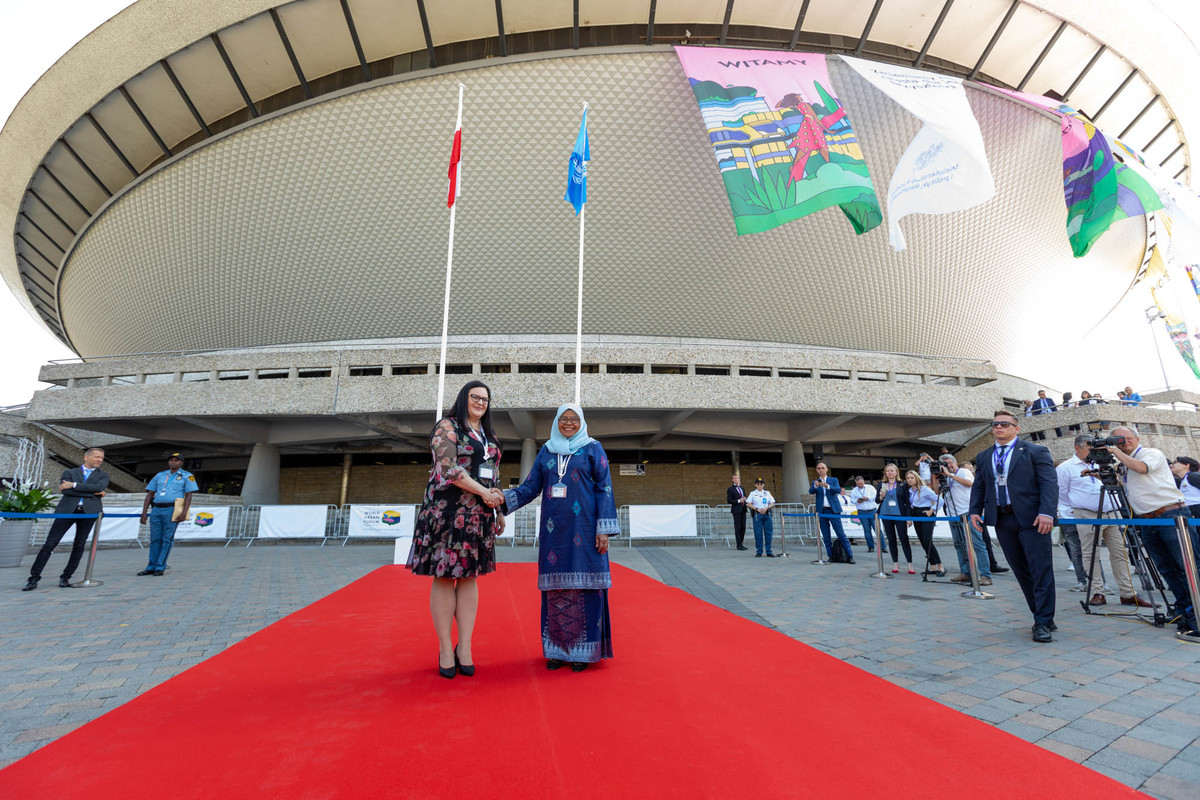The World Urban Forum is underway!
The flag-raising was attended by Maimunah Mohd Sharif, Executive Director of the UN Human Settlements Programme (UN-Habitat); Grzegorz Puda, Minister of Development Funds and Regional Policy; Republic of Poland, and Małgorzata Jarosińska-Jedynak, Secretary of State at the Ministry of Development Funds and Regional Policy; Marcin Krupa, Mayor of Katowice.
With the raising of the United Nations flag, the conference arena became a UN Blue Zone for the five days of the conference.
This is the Eleventh Session of the World Urban Forum (WUF11) and the first time that it is being held in eastern Europe. Katowice was chosen as a city that has transitioned successfully from a heavy industrial centre into a hub of technology, culture and events.

It will be the biggest World Urban Forum so far. For the first time, it will be a fully hybrid event, with nearly 23,000 registered attendees. The vast majority, however, will be attending in-person. They can choose from a total of 451 events, ranging from small roundtables to special sessions and dialogues. The opening and closing sessions will take place in the Spodek Arena, one of the largest indoor arenas in the country.
The first day of WUF11 was given over to meetings of UN-Habitat’s five Assemblies: Grassroots, Children and Youth, Local and Regional Governments, Women’s and Business.
The assemblies were created to allow different stakeholder groups to bring a variety of urban issues to the table, and allow them to contribute ideas or language to the Declared Actions drawn up at the end of the conference.
Unusually in the UN system, the World Urban Forum is a non-legislative meeting, which makes for a more informal environment where participants and interest groups can express their concerns, be heard and bring their voice to the attention of member states.
It is what Ms Sharif has called a “marketplace for innovation”, where UN-Habitat is keen to collect ideas and feedback from events, to test new ideas and gather material for developing policy.
The Declared Actions are intended to compensate for the lack of a resolution which accompanies most UN high level meetings. They are designed to ensure that positive, tangible outcomes come out of the forums.
Assembly meetings on 26 June varied from 20 people in breakout sessions to 250 people attending the high-level World Assembly of Local and Regional Governments, which opened with an address by Ms Sharif.
“Your role, and local action, is critical to build sustainable, resilient and independent societies.”
Maimunah Mohd Sharif, Executive Director of UN-Habitat
A simultaneous Children and Youth Assembly breakout session featured representatives from vulnerable communities in Kenya, Zambia and Romania bringing powerful, first-hand accounts of the difficulties young people face with mental health. The discussion was moderated by Taylor Garner, from UN-Habitat’s Colombia office.
The panel generated policy ideas and calls for action, which will be presented to a roundtable of local and national government governments later in the week. True to the spirit of the World Urban Forum, it will give youth representatives direct access to politicians and policy-makers that can often be hard to achieve.
